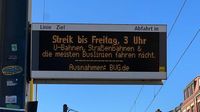Berlin is currently facing its fourth major strike of the year as the BVG (Berliner Verkehrsbetriebe) workers take a stand for better wages. The strike began on Wednesday, March 19, 2025, at 3:00 AM and is set to last for 48 hours, significantly affecting the city’s public transportation system.
More than 16,600 BVG employees, represented by the Verdi union, are protesting for increased wages amidst ongoing negotiations that have seen limited movement from the BVG management. The union is demanding a monthly pay increase of €750 for all employees, a request that the BVG has not met, instead offering half of that amount along with more extended contract duration terms.
The current negotiations have been contentious, with Verdi stating they could call for an indefinite strike starting April if satisfactory terms are not reached. Union representatives emphasize that the time for serious negotiations has come, asserting, "It’s up to the BVG to offer something concrete" about wage increases. As expected, the strike brought public transport to a halt, with no U-Bahn, trams, or buses available to commuters, creating significant disruptions citywide.
In response to the anticipated rush caused by the strike, the S-Bahn Berlin has increased its service on several lines. On March 19 and 20, additional trains will run between 9 AM and 2 PM on the S1 and S5 lines. This adjustment is aimed at alleviating congestion for commuters relying on alternative transportation amid the strike. Despite these efforts, traffic is expected to be heavy, with number of more vehicles on roads causing delays.
The union's strike action comes just days before a critical negotiation session on Friday, March 21, 2025. Verdi’s announcement of potential ballot measures for indefinite strikes underscores the growing frustration among workers over what they perceive to be insufficient responses from BVG management. "If we do not see any progress, we’ll have to consider taking our demands directly to the streets," said a union spokesperson.
On the ground, the effects of the strike are immediate, with buses, trams, and underground trains all stopped until the early morning of Friday, March 21. The BVG has made it clear this strike is part of a larger effort to negotiate better pay and working conditions for its employees. The management has highlighted that the current offer includes a total of €250 million for salaries over 24 months, but Verdi argues that this is inadequate.
Travelers are advised to plan their routes carefully, as many have turned to cycling or are opting for taxis to reach their destinations. Traffic reports indicate longer travel times, with delays of over 20 minutes reported across major roads in Berlin. The S-Bahn system, while operational, is experiencing delays and cancellations due to police operations affecting lines such as S7 and S25.
The growing public response is a testament to the crucial role that BVG plays in the daily lives of residents. “It’s tough, but we understand the need for the strike,” noted one commuter as he navigated the chaotic streets on his bike. The sentiment among many is that while they may be inconvenienced, the workers' demands are justified.
Looking ahead, the BVG and Verdi face a pivotal moment in their negotiations that could shape the future of public transport in Berlin. Both sides are under pressure from the public and the government, which has remained largely silent on the growing unrest. Observers are keen to see if this strike will prompt a resolution or if it will escalate further into larger and longer-lasting labor disputes.
As the city waits for the outcome of negotiations on March 21, the tension between BVG employees and management illuminates the broader struggles for better wages and working conditions faced by many laborers in various sectors. The challenge for both parties now is to find common ground before the dissatisfaction erupts into protracted unrest. People across Berlin are alert to these developments, recognizing that the resolution may significantly impact the daily commute and the city’s larger economic health.
In this climate, all eyes are on the future talks and the potential for either mitigation of the ongoing strike or a declaration of indefinite action by Verdi.








